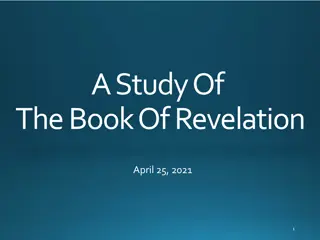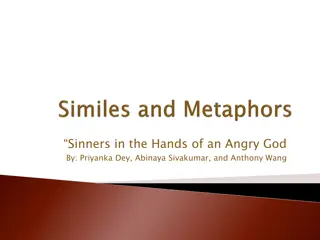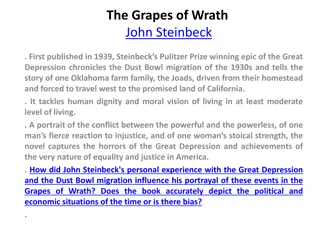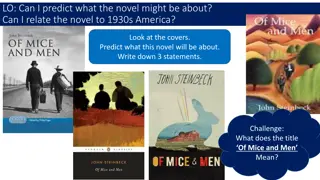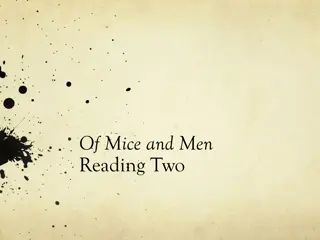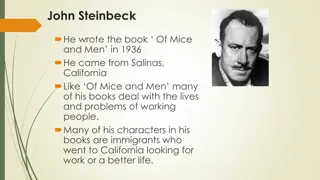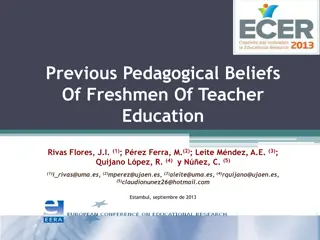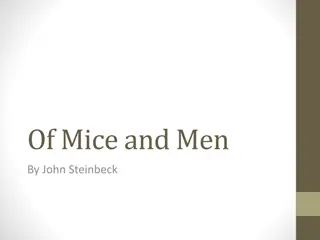John Steinbeck and The Grapes of Wrath: Biographical Insights
Explore the life of John Steinbeck, from his upbringing in Salinas, California, to his literary achievements and influences for "The Grapes of Wrath." Learn about the historical context of the Great Depression and its impact on farmers, which inspired Steinbeck's iconic novel. Delve into the Pulitzer Prize-winning work and its enduring legacy in American literature.
Download Presentation

Please find below an Image/Link to download the presentation.
The content on the website is provided AS IS for your information and personal use only. It may not be sold, licensed, or shared on other websites without obtaining consent from the author. Download presentation by click this link. If you encounter any issues during the download, it is possible that the publisher has removed the file from their server.
E N D
Presentation Transcript
John Steinbeck and The Grapes of Wrath Biographical and Historical Background
John Ernst Steinbeck Born in Salinas, California on February 27, 1902 Parents encouraged his love of writing Learned about ranch life as a teen during summers Graduated from Salinas High School in 1919 Attended Stanford University Poor attendance Steinbeck only took classes that interested him (writing, literature, marine biology, etc.) Left Stanford in 1925 First novel, Cup of Gold, published in 1929 Married his first wife, Carol Henning in 1930 Carol was instrumental in writing Steinbeck s most famous novels
Lived in Pacific Grove, California (near Monterey, CA) Tortilla Flat (1935) received the California Commonwealth Club s Gold Medal for best novel by a California author. The California novels In Dubious Battle (1936) Of Mice and Men (1937) The Grapes of Wrath (1939) War Correspondent during World War II Articles collected in Once There Was a War The Moon is Down - propaganda Married Gwen Congar, 1943 Two children, Thomas and John Jr. Divorced in 1948 Married Elaine Scott, 1950 Died December 20, 1968
The Grapes of Wrath Written between February and October, 1938 L Affaire de Lettuceberg an attempt at satire Steinbeck destroyed the manuscript The Harvest Gypsies Articles written for the San Francisco News Eventually published as a book An excellent introduction to The Grapes of Wrath Instant best seller Pulitzer Prize (1939) Made into a feature film (1940) Nobel Prize in Literature (1962) Banned in Kern County, California Steinbeck was accused of being a communist
The Grapes of Wrath - Influences Learned from Tom Collins Manager of Arvin, a federal migrant labor camp Shared reports with Steinbeck Steinbeck visited him and Arvin Ed Ricketts friend and Marine Biologist Carey McWilliams Factories in the Field Dorothea Lange and her photographs Corresponded with Steinbeck Dorothea Lange and her photographs Corresponded with Steinbeck Migrant Mother Dorothea Lange Tom Collins
The Great Depression Farmers were struggling before the Stock Market Crash of 1929 Poor farming methods Overworked land Farmers went bankrupt Too many loans Crops failed The Dust Bowl Severe drought Topsoil blew away Black Tuesday Manmade environmental catastrophe Millions of people lost their land Headed west
The Joad Family Tom Joad Oldest son Just released from prison Ma Joad Matriarch The citadel of the family Pa Joad Father, sharecropper Rose of Sharon (Rosasharn) Daughter Pregnant, married to Connie Al Joad The Grapes of Wrath 20th Century Fox (1940) Tom s younger brother Teenager, responsible for the family truck Jim Casy Former preacher Joins the family as they head west
The Grapes of Wrath - Overview Follows the Joad family as they head to California Sharecroppers, lost their land Drive highway 66 to California Roadside camping In California Squatters Camp/Hooverville Weedpatch federal migrant labor camp (Arvin) Hooper Ranch corporate owned camp The Dream: Find work in California Pool their money Buy land and return to farming
Major Themes From I to We Abuse of power Family Movement Industrial vs. Agrarian farming Dignity The Grapes of Wrath 20th Century Fox (1940)



